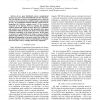Free Online Productivity Tools
i2Speak
i2Symbol
i2OCR
iTex2Img
iWeb2Print
iWeb2Shot
i2Type
iPdf2Split
iPdf2Merge
i2Bopomofo
i2Arabic
i2Style
i2Image
i2PDF
iLatex2Rtf
Sci2ools
127
click to vote
SASO
2010
IEEE
2010
IEEE
Self-Adaptive Resource Allocation in Open Distributed Systems
In an open distributed system, computational resources are peer-owned, and distributed over time and space. The fact that these resources can dynamically join or leave the system (or can be discovered at runtime) leads to opportunities to carry out computations without statically owned resources, harnessing the collective compute power of the resources connected by the Internet. However, realizing this potential requires efficient and scalable resource discovery, coordination and control; not to mention that the dynamicity that makes opportunities visible at runtime also leads to uncertainty about continuous availability of the needed resources. In this paper, we present our experimental work using a resource-oriented temporal logic, ROTA, to reason about accommodating mobile distributed computations in an open system. Our results show that the approach leads to better accommodation of computations and scales well by avoiding unnecessary migrations.
Related Content
| Added | 14 Feb 2011 |
| Updated | 14 Feb 2011 |
| Type | Journal |
| Year | 2010 |
| Where | SASO |
| Authors | Xinghui Zhao, Nadeem Jamali |
Comments (0)

